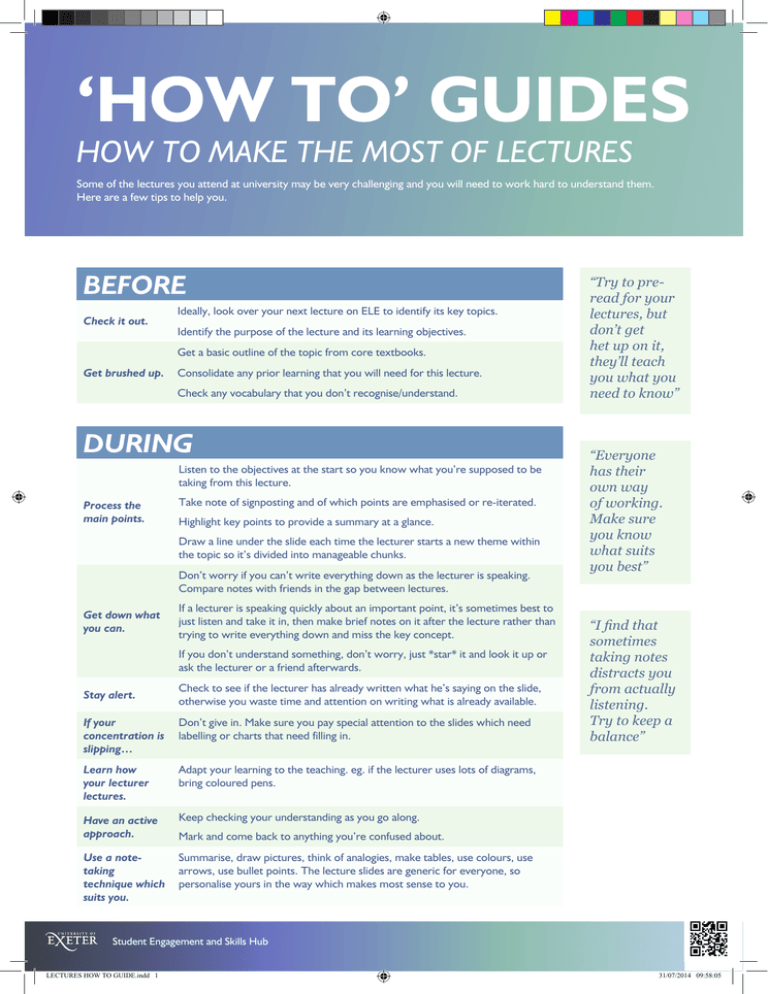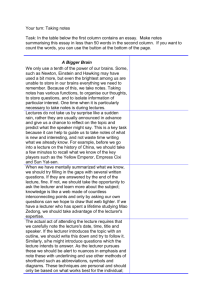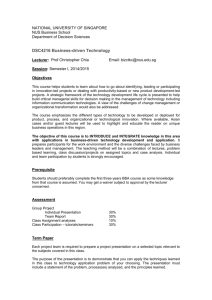‘HOW TO’ GUIDES HOW TO MAKE THE MOST OF LECTURES
advertisement

‘HOW TO’ GUIDES HOW TO MAKE THE MOST OF LECTURES Some of the lectures you attend at university may be very challenging and you will need to work hard to understand them. Here are a few tips to help you. BEFORE Check it out. Ideally, look over your next lecture on ELE to identify its key topics. Identify the purpose of the lecture and its learning objectives. Get a basic outline of the topic from core textbooks. Get brushed up. Consolidate any prior learning that you will need for this lecture. Check any vocabulary that you don’t recognise/understand. DURING Listen to the objectives at the start so you know what you’re supposed to be taking from this lecture. Process the main points. Take note of signposting and of which points are emphasised or re-iterated. Highlight key points to provide a summary at a glance. Draw a line under the slide each time the lecturer starts a new theme within the topic so it’s divided into manageable chunks. Don’t worry if you can’t write everything down as the lecturer is speaking. Compare notes with friends in the gap between lectures. Get down what you can. If a lecturer is speaking quickly about an important point, it’s sometimes best to just listen and take it in, then make brief notes on it after the lecture rather than trying to write everything down and miss the key concept. If you don’t understand something, don’t worry, just *star* it and look it up or ask the lecturer or a friend afterwards. Stay alert. Check to see if the lecturer has already written what he’s saying on the slide, otherwise you waste time and attention on writing what is already available. If your concentration is slipping… Don’t give in. Make sure you pay special attention to the slides which need labelling or charts that need filling in. Learn how your lecturer lectures. Adapt your learning to the teaching. eg. if the lecturer uses lots of diagrams, bring coloured pens. Have an active approach. Keep checking your understanding as you go along. Use a notetaking technique which suits you. Summarise, draw pictures, think of analogies, make tables, use colours, use arrows, use bullet points. The lecture slides are generic for everyone, so personalise yours in the way which makes most sense to you. “Try to preread for your lectures, but don’t get het up on it, they’ll teach you what you need to know” “Everyone has their own way of working. Make sure you know what suits you best” “I find that sometimes taking notes distracts you from actually listening. Try to keep a balance” Mark and come back to anything you’re confused about. Student Engagement and Skills Hub LECTURES HOW TO GUIDE.indd 1 31/07/2014 09:58:05 AFTER If available, listen to the lecture again on ELE if you feel you missed anything. Go over it. Go over your lectures straight away. It seems like a bore but you’ll be so grateful when it comes to revision. “Keep on top of lectures, it makes exams so much less stressful” Give yourself an hour to work on a lecture. Reward yourself after. Rewrite your notes in an order that makes sense to you; slides aren’t always in the most intuitive sequence. Break the lecture down into its component parts. If you write your notes out in full, re-write them more briefly each time, just summarising the key points so you can flick through them in the days before an exam. Write out notes. Make flashcards – get an app for it! eg. ‘Brainscape’. Make tables to concisely summarise material. This also helps to develop and link themes as you fit different things into appropriate columns. Print off the slides for anything which needs rote learning - there’s no point wasting time writing it up. Write yourself test questions that you’d like to be able to answer by the time you come to the exam. You could stick post-it notes with these questions over each slide to test yourself, then peel them off to reveal the answers. Make your notes yours. Write your notes in your own words, think of how you would explain the information in a conversation. The more basic the better; if you understand the basics you will remember the details more easily. Would you understand your notes if you looked at them in a week’s time? Check for quality. Understanding is everything. Imagine revising from your notes – have you covered all the objectives? Look at past exam papers to see if your notes are good enough to answer the questions. What more do you need to know? If you don’t understand a topic, add to it with information from textbooks and websites, start with the basics eg. Wikipedia and work your way up eg. journals. Try watching videos on something you don’t understand. It’s quite often easier to understand speech and demonstrations than text. “Remember that if you’re confused, probably everyone else is too. Don’t be afraid to talk to the lecturer, they’re there to help” “A degree isn’t a competition, you could all help each other out and all still get firsts! Exchange notes, ideas, revision tips between you” Compare your notes with a friend’s and try explaining concepts to each other. You might uncover something you missed or didn’t understand Work together. Have a conversation about something you found interesting - you’ll remember it better. Delegate tasks amongst friends and then collate all the information to save time and increase productivity. Have you seen the other Guides in this series? Think of analogies to help you remember abstract concepts. Your brain will find it easier to remember something it’s come across before! How to… Draw diagrams and pictures, create images in your head. Be creative. Come up with acronyms, mnemonics and ‘sounds like’ for, eg. drugs names or author’s names, the sillier the better – the more you’ll remember them! Memorise whilst on the move; link the words to your actions - it sounds crazy but it works. Keep it safe. Ensure you have a good storage system for all notes, whether electronic or paper-based. Manage your time Read effectively Write essays & reports Reference & avoid plagiarism Manage exams Give presentations Manage groupwork For further information, please go to ELE -> ‘Student Resources’ -> ‘Undergraduate Skills’. Student Engagement and Skills Hub LECTURES HOW TO GUIDE.indd 2 31/07/2014 09:58:05


